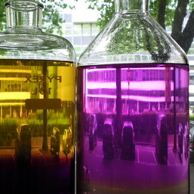CRTS:Waste Streams
This page is our Waste Management Portal with links to related content on each of the Waste Streams that College operates.
Waste Streams
There are a variety of Waste Streams in operation within the Department covering everything from domestic (landfill and recycling) all the way to hazardous clinical and chemical wastes. We must all be extremely vigilant to ensure no-one is unnecessarily exposed to any hazardous wastes once they have left your labs.
Domestic Waste
The Department produces domestic waste as you would expect of any place of work or study. These are the landfill bins in eating areas and offices, including those located in labs for disposable gloves and blue roll etc.
All of these bins are emptied by cleaning staff not directly employed by the department, nor trained to handle chemicals. We all share a communal responsibility not to expose these members of staff to any hazardous wastes that they should not come into contact with.
Landfill & Recycling
The College operates a number of 'Green' initiatives, one of which centres on properly separating domestic waste to cut-down on the volumes sent to landfill. This is the reason for the colour coded bins, all of which are helpfully labelled and usually have some nearby information to explain this to you. You can find more information on the College's web page here.
Glass Waste
Chemistry Research Laboratories contain more glass-ware than you would find in many other organisations; we also receive a large proportion of our goods packaged in glass due to its considerable imperviousness to chemical attack.
Of all the glass-ware you come into contact with - some is disposable after single-use, some is recycled and some just gets broken. In all of these categories, glass should be clean before it leaves your lab.
Disposal
Glass disposal is carried out by group-members and deposited in the Red bins in the glass lock-up near the Chemistry Loading Bay. All glass-ware should be clean prior to disposal, but we still recommend you wear a face-mask should any small fragments, dust or silica powder be kicked up when you empty your bins into the larger carts.
The key for the glass disposal lock-up can be obtained from the Technicians in 132a daily at 2pm. It must also be returned immediately after you have finished with it.
Recycling
As a department we have an extremely high-turnover of solvents, which are normally shipped in 2.5 L glass winchesters. Because the number is so high, we have an arrangement with the suppliers to collect their brand winchesters for re-use and/or recycling.
Every lab should have been allocated a large grey plastic box, this is the location for clean, dry winchesters to be deposited for collection by the cleaners. DO NOT place any other items in these boxes, they are for clean, dry winchesters only.
Chemical Waste
We are a Chemistry Department and consequently we use many chemicals. It is understandable that we generate a fair amount of Chemical Waste. This is often a more hazardous area than pure commercial chemicals as we do not always know precisely what chemicals we are dealing with.
You can help us, and yourselves, by making sure all chemicals are labelled. Do not store chemicals/waste for longer than necessary. If you are unsure enough about the quality/identity of any research chemicals not to use them for your research - it is unlikely any-one else will want to use them either. Get rid of them as soon as you can. This helps us by reducing the number of unknowns we receive and it reduces the risk to yourselves by storing less of hazardous chemicals.
More specific information can be found on the dedicated page here.
